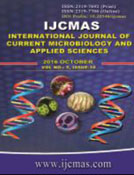


 National Academy of Agricultural Sciences (NAAS)
National Academy of Agricultural Sciences (NAAS)

|
PRINT ISSN : 2319-7692
Online ISSN : 2319-7706 Issues : 12 per year Publisher : Excellent Publishers Email : editorijcmas@gmail.com / submit@ijcmas.com Editor-in-chief: Dr.M.Prakash Index Copernicus ICV 2018: 95.39 NAAS RATING 2020: 5.38 |
The incidence of colonization and infection with Candida species has risen dramatically in the past decade with high rates of carriage in neonates, especially pre-terms, attributed to the advancement in medical field, life support systems, relative immunodeficiency, extensive use of broad spectrum antibiotics. Therefore we conducted this study to determine the colonization and candidemia in neonates admitted to neonatal intensive care unit along with its risk factors and possible maternal and nosocomial source. Isolated candida species was identified and their susceptibility to different antifungal agent determined. This study was carried out in the Department of Microbiology, S.P. Medical College from March 2012 to March 2013 on a total of 2132 samples collected from neonates admitted to neonatal intensive care unit of department of paediatric and labour room, P.B.M. Hospital, Bikaner, Vaginal swabs from pregnant women, swabs from hands of health care staff in NICU & from nasogastric tube and iv line. Candida colonization rate was 47.31% in neonates admitted to NICU, more frequently in preterm neonates with IV antibiotics. Candidemia was 11.1% in neonates of NICU. Candida albicans was the most common species causing colonization and Candidemia. All candida species were susceptible to all antifungal agents except Candida krusei & Candida glabrata which were highly resistant to Fluconazole. I.V. antibiotics, preterm neonates, low birth weight, RDS, Ventilation therapy and prior Candida colonization were identified as significant risk factors. Candida Parapsilosis is an emerging fungal pathogen and incidence of infection caused by it may continue to rise.
 |
 |
 |
 |
 |